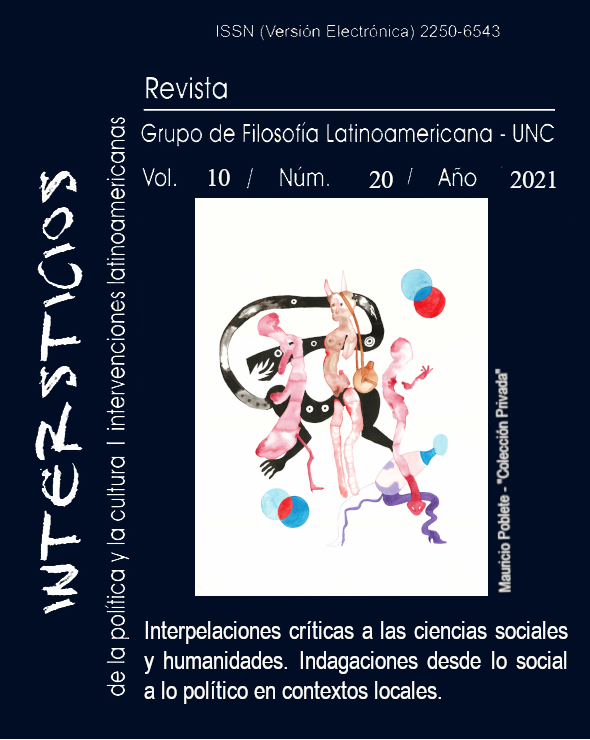Reflections on alternative Latin American proposals for democracy: Castro Gómez, Laclau and Dussel
Keywords:
Democracy, Hegemony, Potentia-potestasAbstract
In recent decades, the philosophical discussion regarding democracy has been enhanced by the enriching contributions of three Latin American thinkers: Dussel, Laclau and Castro Gómez, who, in order to propose alternatives to the neoliberal model of democracy, have developed sophisticated philosophical readings of politics and articulated different models of democracy, based on the theory of hegemony. Although they appeal to different theoretical traditions and postulates, they share the objective of radicalizing democracy and legitimizing emancipatory policies aimed at the inclusion of the victims of capitalism, patriarchy and racism, among other forms of social and cultural exclusion. Dussel proposes a foundationalist philosophy of politics and a democracy based on material, discursive and efficacy-related assumptions. Laclau, for his part, proposes a theory of hegemony which, under discursive postulates, tries to articulate the instituting antagonism in institutions that allow the hegemonic game oriented towards social emancipation. For his part, Castro Gómez, in a permanent dialectic with Dussel and Laclau, proposes a theory of hegemonic-democracy, which recovers republican values and mixes them with the transmodern recovery of the traditions blocked by Eurocentric modernity.
Downloads
References
Anderson, Perry (1991) Las antinomias de Antonio Gramsci. Estado y Revolución en Occidente, Fontanamara, Barcelona.
Castro Gómez, Santiago (2015) Revoluciones sin sujeto. Slavoj Žižek y la crítica del historicismo posmoderno, Akal, España.
Castro Gómez, Santiago (2019) El tonto y los canallas. Notas para un republicanismo transmoderno, Pontificia Universalidad Javeriana, Bogotá.
Dussel, Ernesto (2009) Política de la liberación. Arquitectónica. Volumen II, Trotta, Madrid.
Dussel, Ernesto (2010) 20 tesis de política, El perro y la rana, Caracas.
Dussel, Ernesto (2016) Filosofías del Sur. Descolonización y Transmodernidad, Akal, México.
Laclau, Ernesto (1993) “Discurso”, Revista Topos & Tropos, Córdoba Nº1, www.topos ytropos.com.ar/N1/pdf/Discurso.pdf
Laclau, Ernesto (2005) La razón populista, Fondo de Cultura Económica, Buenos Aires.
Laclau, Ernesto (2015) “Hacia una teoría del populismo”, en: Política e ideología en la teoría marxista, Siglo XXI, Buenos Aires.
Laclau, Ernesto y Mouffe, Chantal (1993) “Posmarxismo sin pedido de disculpas (con Chantal Mouffe)”, en: Nuevas reflexiones sobre la revolución de nuestro tiempo, Nueva Visión, Buenos Aires
Laclau, Ernesto y Mouffe, Chantal (2010) Hegemonía y Estrategia socialista. Hacia una radicalización de la democracia, Fondo de Cultura Económica, Buenos Aires.
Laval y Dardot (2013) La nueva razón del mundo. Ensayo sobre la sociedad neoliberal, Gedisa, Barcelona.
Marchart, Oliver (2009) El pensamiento político posfundacional. La diferencia política en Nancy, Lefort, Badiou y Laclau, Fondo de Cultura Económica, Buenos Aires.
Mouffe, Chantal (1999) El retorno de lo político. Ciudadanía, pluralismo, democracia radical, Paidós, Barcelona.
Mouffe, Chantal (2007) En torno a lo político, Fondo de Cultura Económica, Buenos Aires.
Portelli, Hugues (2000) Gramsci y el bloque histórico, Siglo XXI, Buenos Aires.
Recanatti, Guillermo (2018) Ética, política y religión en el pensamiento de Enrique Dussel, Ediciones de Icala, Rio Cuarto, Argentina.
Vergara Estévez, Jorge (1999) “El modelo neoliberal de democracia”, en: Anuario de filosofía jurídica y social. Diálogos con Norberto Bobbio y G. H Von Wright, Edeval, Valparaíso, Chile.
Downloads
Published
Issue
Section
License

This work is licensed under a Creative Commons Attribution-NonCommercial-ShareAlike 4.0 International License.
Authors who have publications with this journal agree to the following terms:
a. Authors will retain their copyright and grant the journal the right of first publication of their work, which will simultaneously be subject to the Creative Commons Attribution License that allows third parties to share the work as long as its author and first publication in this journal are indicated.
b. Authors may adopt other non-exclusive license agreements for distribution of the published version of the work (e.g., deposit it in an institutional telematic archive or publish it in a monographic volume) as long as the initial publication in this journal is indicated.
c. Authors are allowed and encouraged to disseminate their work through the Internet (e.g., in institutional telematic archives or on their web page) after the publication process, which may produce interesting exchanges and increase citations of the published work (see The effect of open access).


